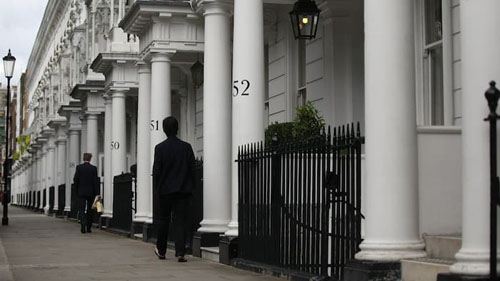Chinese investors have increased their focus on London’s property market, partly because of the fall in the pound and partly because there are signs of an end to China’s own property bubble.
Sales of homes in the capital’s most exclusive areas to Chinese buyers have risen since the Brexit vote, while investment into commercial property from China is on track to grow this year, even as other investors draw back.
“The British currency is at a 30-year low; the Chinese housing market is at a 25-year high. Why look any further?” said Terry Li, a project director for Beijing-based CY Infotech and owner of a home in Kensington, west London.
An online property portal said it received a record number of inquiries from Chinese buyers about British properties in September. Before that, in the third quarter of 2016, Chinese purchases of upmarket London homes rose to 2.6 per cent of home transactions from 1.8 per cent the previous quarter, reversing a period of decline.
Charles McDowell, a high-end London estate agent, said Chinese homebuyers were “out there and looking to spend big money… they are buying small residential units but also great big lumps”.
Mr McDowell said he had sold a £160m Mayfair home to a Chinese buyer since the Brexit vote. “The weak pound has made a difference to them. In fact, it has saved the London property market,” he said.
The increase in the commercial propertye market was even more pronounced: in the six months leading up to the Brexit vote, Chinese buyers poured $1.7bn into London commercial property, a 75 per cent rise from a year earlier, according to Knight Frank, a real estate consultancy.
David Ji, Knight Frank’s head of China research, said: “Although overall investment into British commercial buildings declined this year, we saw Chinese investment alone go up. We see no signs of tapering post-referendum.”
Significant deals included the first London property purchase by Minsheng bank, the £84.5m acquisition of an office building through a Hong Kong subsidiary.
Mei Jie, chair of Zhejiang Kailongjia Investment Management, which manages property funds in the southern tech capital of Shenzhen, said his company had decided after the Brexit vote to raise a new Rmb10m ($1.5m) fund for investment in London office buildings.
“The underlying property market has not, and will not change. But investors are more interested because of the currency rate,” he said.
Despite the economic uncertainty of Brexit, Chinese buyers see the British currency and property markets as stable in the long term.
In a survey of Chinese people with assets of over $1.5m, the Hurun Institute found that 60 per cent planned to buy property overseas in next three years, and that the depreciation of the renminbi was a key concern for more than half.
"Pound depreciation will not affect the long-term value of our investments. If you were looking for short-term gains, you would stay in China, where there are big rises and big risks. But safety is the key quality for investments in the UK," said Mr Li.
James Roberts, chief economist at Knight Frank in London, said Chinese investment into the city was partly driven by faith in its institutions, such as the courts.
China’s mega-cities present riskier options. Shenzhen and Shanghai have experienced price rises of over 40 per cent this year, and local governments across the country are now trying to cool property markets by restricting purchases.
In cities such as Beijing, those without a local hukou (regional welfare registration) can only buy one house, and those with a local hukou can at most buy two. That has led to an excess of savings made by China's super-rich, which is now flowing abroad.
“People [from East Asia] have been thinking of going into the UK property market for years. Brexit is just an opportunity: they were looking anyway, and now they are pouncing while the currency is low," said Mr Li. “My friends from Hong Kong and Singapore, the ex-colonies, consider their capital to be London.”
Financial Times
Please
contact us in case of Copyright Infringement of the photo sourced from the internet, we will remove it within 24 hours.
